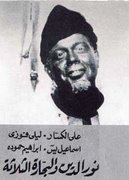صراع الحضارات ليس قدرا تاريخيا
تأصيل الديموقراطية والدولة المدنية
تأسيس أول
Samuel Huntington was only half right. The cultural fault line that divides the West and the Muslim world is not about democracy but sex. According to a new survey, Muslims and their Western counterparts want democracy, yet they are worlds apart when it comes to attitudes toward divorce, abortion, gender equality, and gay rights --- which may not bode well for democracy's future in the Middle East.
Why doesn't democracy grab hold in the Middle East? What is there about the culture and the people and so on where democracy just doesn't seem to be something they strive for and work for?"
The Muslim world lacks the core political values that gave birth to representative democracy in Western civilization: separation of religious and secular authority, rule of law and social pluralism, parliamentary institutions of representative government, and protection of individual rights and civil liberties as the buffer between citizens and the power of the state. This claim seems all too plausible given the failure of electoral democracy to take root throughout the Middle East and North Africa. According to the latest Freedom House rankings, almost two thirds of the 192 countries around the world are now electoral democracies. But among the 47 countries with a Muslim majority, only one fourth is electoral democracies--- and none of the core Arabic-speaking societies falls into this category.
Yet this circumstantial evidence does little to prove Huntington correct, since it reveals nothing about the underlying beliefs of Muslim publics. Indeed, there has been scant empirical evidence whether Western and Muslim societies exhibit deeply divergent values--- that is, until now. The cumulative results of the two most recent waves of the World Values Survey (WVS), conducted in 1995¡V96 and 2000¡V2002, provide an extensive body of relevant evidence. Based on questionnaires that explore values and beliefs in more than 70 countries, the WVS is an investigation of socio-cultural and political change that encompasses over 80 percent of the world's population. A comparison of the data yielded by these surveys in Muslim, and non-Muslim societies around the globe confirms the first claim in Huntington's thesis: Culture does matter--- indeed, it matters a lot. Historical religious traditions have left an enduring imprint on contemporary values. However, Huntington is mistaken in assuming that the core clash between the West and Islam is over political values. At this point in history, societies throughout the world (Muslim and Judeo-Christian alike) see democracy as the best form of government. Instead, the real fault line between the West and Islam, which Huntington's theory completely overlooks, concerns gender equality and sexual liberalization. In other words, the values separating the two cultures have much more to do with Eros than demos. As younger generations in the West have gradually become more liberal on these issues, Muslim nations have remained the most traditional societies in the world. This gap in values mirrors the widening economic divide between the West and the Muslim world. Commenting on the disenfranchisement of women throughout the Middle East, the United Nations Development Programme observed last summer that "no society can achieve the desired state of well-being and human development, or compete in a globalizing world, if half its people remain marginalized and disempowered." But this "sexual clash of civilizations" taps into far deeper issues than how Muslim countries treat women. A society's commitment to gender equality and sexual liberalization proves time and again to be the most reliable indicator of how strongly that society supports principles of tolerance and egalitarianism. Thus, the people of the Muslim world overwhelmingly want democracy, but democracy may not be sustainable in their societies.
Any claim of a "clash of civilizations" based on fundamentally different political goals held by Western and Muslim societies represents an oversimplification of the evidence. Support for the goal of democracy is surprisingly widespread among Muslim publics (Egyptian blogs is a true example), even among those living in authoritarian societies. Yet
Huntington is correct when he argues that cultural differences have taken on a new importance, forming the fault lines for future conflict. Although nearly the entire world pays lip service to democracy, there is still no global consensus on the self-expression values--- such as social tolerance, gender equality, freedom of speech, and interpersonal trust--- that are crucial to democracy.
Today, these divergent values constitute the real clash between Muslim societies and the West.
But economic development generates changed attitudes in virtually any society. In particular, modernization compels systematic, predictable changes in gender roles: Industrialization brings women into the paid work force and dramatically reduces fertility rates. Women become literate and begin to participate in representative government but still have far less power than men. Then, the postindustrial phase brings a shift toward greater gender equality as women move into higher-status economic roles in management and gain political influence within elected and appointed bodies. Thus, relatively industrialized Muslim societies such as Turkey share the same views on gender equality and sexual liberalization as other new democracies.
Even in established democracies, changes in cultural attitudes--- and eventually, attitudes toward democracy--- seem to be closely linked with modernization.
The United States cannot expect to foster democracy in the Muslim world simply by getting countries to adopt the trappings of democratic governance, such as holding elections and having a parliament. Nor is it realistic to expect that nascent democracies in the Middle East will inspire a wave of reforms reminiscent of the velvet revolutions that swept Eastern Europe in the final days of the Cold War. A real commitment to democratic reform will be measured by the
willingness to commit the resources necessary to foster human development in the Muslim world. Culture has a lasting impact on how societies evolve. But culture does not have to be destiny.


